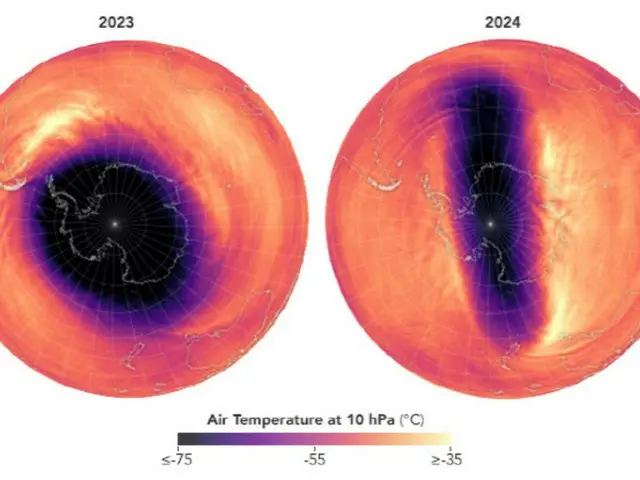According to the NASA Earth Observatory on the 3rd (local time), Lawrence Coy and Paul New, atmospheric researchers at NASA's Goddard Space Flight Center,
Mann found that in July, temperatures in the Antarctic satellite stratosphere rose by up to 17 degrees Celsius above average. Antarctica is in the northern hemisphere, opposite Japan, where July is mid-winter.
The weather is unimaginably cold, at around minus 80 degrees Celsius, but on July 7th the temperature in the stratosphere rose by 15 degrees. Then, on July 22nd, the temperature dropped again, and on August 5th it rose again by 17 degrees.
The researcher said, "July was the fastest stratospheric warming in the 44 years that the Earth Atmospheric Data Analysis Institute has been recording it." The polar vortex, a large-scale vortex of air that occurs in the stratosphere, is also
The Antarctic polar vortex is a strong wind that occurs in the stratosphere, but normally it maintains a round shape like a spinning top, trapping cold air. However, on the 5th of last month, the Antarctic vortex
"Changes in sea surface temperature and sea ice that start in the troposphere can propagate to the upper layers (stratosphere) and cause large-scale climate change," said Newman.
He said it was "difficult to pinpoint the reason" for the sudden rise in Antarctic temperatures. Meanwhile, the average temperature in Antarctica in July this year was up to 30 degrees higher than normal.
According to CNN on the 4th of last month, the temperature in some parts of East Antarctica rose from -25°C to -30°C in July of this year.
He warned that such high temperatures in mid-winter in Antarctica, home to most of the world's ice mass, could lead to deadly sea level rise. If all the ice on Antarctica melted, global mean sea level would rise by 45.72 mph.
Coastal areas around the world are expected to suffer devastating damage.
2024/09/04 09:35 KST
Copyrights(C) Edaily wowkorea.jp 88

